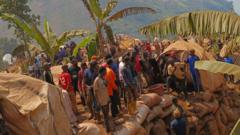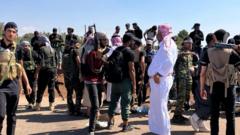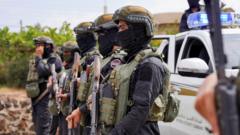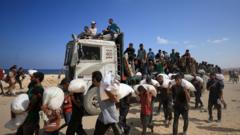The recent ceasefire is providing temporary relief in a region marked by deep-rooted conflict.
**Ceasefire in Suweida: An Unsteady Calm Amid Ongoing Tensions**

**Ceasefire in Suweida: An Unsteady Calm Amid Ongoing Tensions**
A fragile peace holds in southern Syria's Suweida as sectarian violence claims over a thousand lives.
In southern Syria, the city of Suweida is experiencing a tenuous ceasefire following a week of intense sectarian violence that has resulted in over 1,000 fatalities. The violence, primarily between the Druze religious minority and Bedouin tribal militias, has created a desperate humanitarian situation that continues to escalate despite recent government interventions.
On a recent expedition, the BBC managed to get within six miles of Suweida, marking the closest safe approach, yet concerns about Druze snipers creating a deadly atmosphere loomed large. The road to Suweida was littered with the remnants of conflict: abandoned shops, debris, and shell casings returned as stark reminders of the violence that unfolded. Syrian army presence, evident along the route, indicated ongoing military operations and heightened security.
Troops have been deployed by the Syrian government specifically to enforce the fragile truce, but its sustainability remains uncertain. The situation is compounded by the Bedouin militia, who have publicly stated their readiness to retaliate should the ceasefire collapse or their demands—especially regarding the release of injured Bedouin individuals—remain unmet. Tensions were palpable as groups of armed Bedouins were seen celebrating but also signaling their potential for further conflict.
The humanitarian crisis is worsening as accounts emerge from survivors of the recent violence. At Deraa's main hospital, the influx of injured individuals, including a young soldier named Ahmed who was wounded by a grenade, underlined the brutal reality of the ongoing crisis. Ahmed described scenes of unimaginable horror, though details remain unverified.
Red Crescent coordinator Riham Bermawi highlighted ongoing logistical challenges as they attempt to evacuate injured individuals, noting that medical supplies and support were critically low. Sniper fire posed dangerous obstacles during evacuation efforts.
Despite the significant push for peace voiced by local leaders, the road ahead for Syria is fraught with peril and uncertainty. Officials suggest that unity and collaboration are essential for achieving long-term stability and justice for all communities affected by this prolonged conflict, yet local experiences point to an unyielding cycle of violence and distrust that challenges such aspirations.
On a recent expedition, the BBC managed to get within six miles of Suweida, marking the closest safe approach, yet concerns about Druze snipers creating a deadly atmosphere loomed large. The road to Suweida was littered with the remnants of conflict: abandoned shops, debris, and shell casings returned as stark reminders of the violence that unfolded. Syrian army presence, evident along the route, indicated ongoing military operations and heightened security.
Troops have been deployed by the Syrian government specifically to enforce the fragile truce, but its sustainability remains uncertain. The situation is compounded by the Bedouin militia, who have publicly stated their readiness to retaliate should the ceasefire collapse or their demands—especially regarding the release of injured Bedouin individuals—remain unmet. Tensions were palpable as groups of armed Bedouins were seen celebrating but also signaling their potential for further conflict.
The humanitarian crisis is worsening as accounts emerge from survivors of the recent violence. At Deraa's main hospital, the influx of injured individuals, including a young soldier named Ahmed who was wounded by a grenade, underlined the brutal reality of the ongoing crisis. Ahmed described scenes of unimaginable horror, though details remain unverified.
Red Crescent coordinator Riham Bermawi highlighted ongoing logistical challenges as they attempt to evacuate injured individuals, noting that medical supplies and support were critically low. Sniper fire posed dangerous obstacles during evacuation efforts.
Despite the significant push for peace voiced by local leaders, the road ahead for Syria is fraught with peril and uncertainty. Officials suggest that unity and collaboration are essential for achieving long-term stability and justice for all communities affected by this prolonged conflict, yet local experiences point to an unyielding cycle of violence and distrust that challenges such aspirations.




















